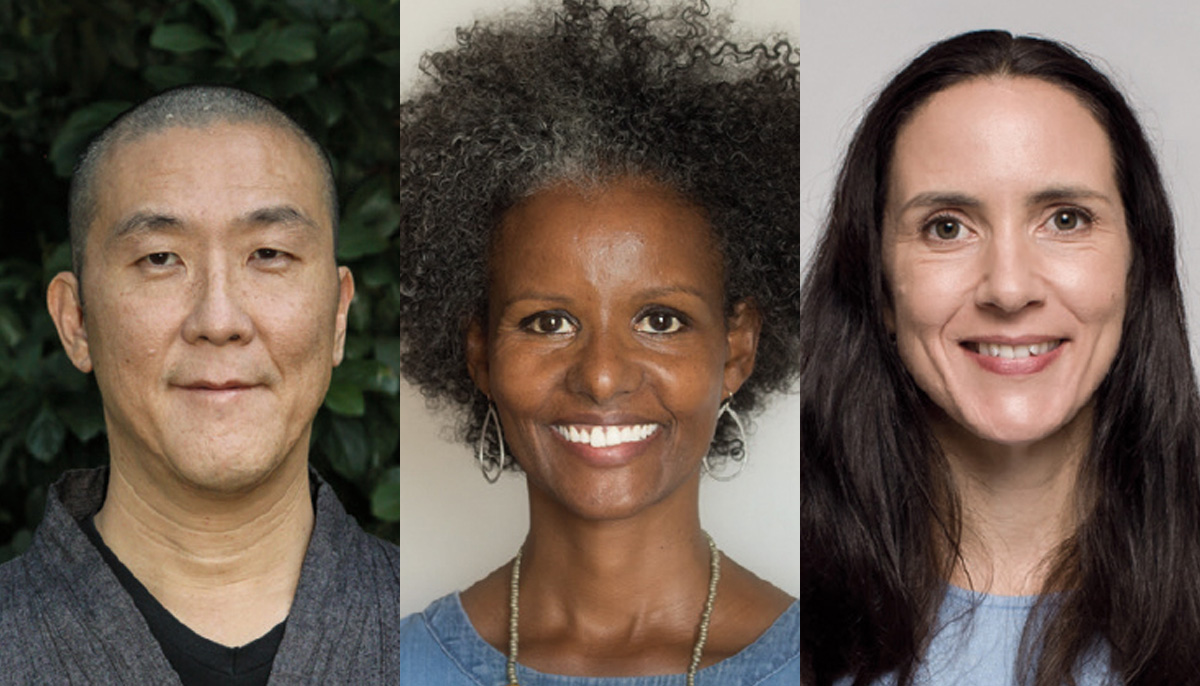Question: Looking at social media and even my own friends, it seems that Buddhists are just as reactive and narcissistic as anyone else. Am I expecting too much? What kinds of changes can we reasonably expect from Buddhist practice?
Guo Gu: This is an important question, and one not so dissimilar from another common question, “In what timeframe can one reasonably expect to learn meditation and reach awakening?” These are difficult to answer because whatever assumptions we may bring to perceiving ourselves and others, buddhadharma is definitely not meant to be a measuring stick for judging people. It is a practice, and it is up to each of us to engage with it and integrate it in our lives so eventually there’s no separation between buddhadharma and our lives. Done correctly, our self-referential attachments diminish.
It is up to us to engage with buddhadharma and be free from our own reactivity and narcissistic tendencies.
That said, naturally there are ups and downs in different periods and circumstances of our lives. Common notions of progress and regress do not apply here. What a “Buddhist” does may appear one way but then change, or it may have a different outcome later; what seem like progress may turn out to be the beginning of the downfall of the practitioner. What may appear as regress or a great challenge may in fact be an occasion for insight and transformation. Through practice, a person entrenched in vexations or narcissism may suddenly have a transformative experience and drop self-referential attachments, at least temporarily. Even when people drop self-attachment, the practice of self-examination is necessary because they may still manifest what appear to be a habit of vexations. All of these scenarios are documented in the scriptures and in the real lives of practitioners, past and present.
As for the “Buddhists” you speak of, is a person a Buddhist just because she professes to be one? Is a person a Buddhist when he takes refuge or meditates but doesn’t apply any of the principles of buddhadharma to his life? There are many Buddhists who use Buddhism to advance their own self-referential ideas or political agenda on social media. There are, in fact, many kinds of “Buddhists.” To generalize that “Buddhists do this or that” is to simplify what is actually very complex, so it is best not to engage in judgments or expectations based on an ideal of what a Buddhist should be. The key is whether or not someone is honestly and correctly integrating the teachings into their lives. We could turn your question around: Do my own actions on social media accord with precepts, compassion, and wisdom? Am I free from reactivity and narcissistic tendencies? It is up to us to engage with buddhadharma and be free from our own reactivity and narcissistic tendencies. In this process of self-examination, we learn to expose, embrace, transform, and let go of our own attachments so that we may realize our own intrinsic freedom.
Sebene Selassie: What kind of changes can we expect from our practice? That depends on so many factors: what our natural tendencies are, what conditioning we have experienced, what we are practicing (and how, and how much), and every combination of these. In my life, change has been gradual, and along the way I have benefited greatly from practice, study, and the support of spiritual friends and teachers.
Practice produces changes in how we relate to everything, including social media. Today, we are fortunate with a few clicks to have access to so many teachings and teachers. But never before have humans consumed so much data. I’ve heard that we take in five times as much information every day as we did in 1986—the equivalent of 174 newspapers. But unlike with newspapers, this information is being generated by almost three billion people.
We need to emphasize more and more the importance of pausing in relationship to technology.
Social media is a mirror for society, a reflection of our collective minds and hearts. We witness through our computers and phones a stream of human thoughts and emotions, both wholesome and unwholesome—thoughtful commentary and impulsive snaps, loving tributes and meanspirited takedowns, lol cat videos and racist memes. These technologies allow us to connect in incredible ways, but they are also intentionally created to be addictive, preying upon what the Buddha identified as the tendency for our minds to incline toward our habits. I hear many practitioners speak of addiction to their gadgets, email, and social media accounts. I struggle with these things too. We may find ourselves checking our phones obsessively throughout the day, even though we make time to meditate every morning. People post without mindfulness. Buddhists are not immune.
This path is sometimes described as going against the stream; with the internet, it’s like going against a tsunami, and the reactivity and narcissism you mention is part of this wave. We need to emphasize more and more the importance of pausing in relationship to technology. I’ve cut down on my social media usage because I noticed how much time and energy it was absorbing in my life. Each of us is responsible for our own reactivity (and our reactivity to the reactivity). It can be disappointing to see that Buddhist friends and even teachers are swept up in these waters.
I encourage you to notice what is underneath your expectations. It might be a longing for a full expression of the freedom and joy highlighted in the teachings—can you appreciate that most of us are also longing for this but not there yet? Are there social media accounts that inspire you? Are there those that continually disappoint? I have a practice of periodically cleaning up my social media by unfollowing accounts that do not align to my values or that stream negativity; while doing so, I make sure to add accounts that provide insights and joy. Hopefully one day social media will reflect an awakened society of wisdom and compassion.
Rose Taylor Goldfield: In an important sense there are no Buddhists; there are only human beings. We cannot know the journey of another human being—even Buddhist ones. They, like each of us, are not Buddhism’s end product. For me, Buddhist practice is about how I am in relationship with my own experience, others, and the world. Through my practice, I gradually find greater ease in these relationships.
But being Buddhist can also come with a cost. I have spent my life surrounded by Buddhists and in Buddhist practice, and I have felt deeply hurt by Buddhist practitioners, teachers, and communities. At the same time, I too behave in ways that are incompatible with my Buddhist ideals, my human ideals. Nevertheless, I do believe my practice increases my ability to see these actions, admit to them, and to heal and resolve them in relationship with others.
As is often the case for Buddhists, it was my wounds that brought me to Buddhism and that also confused my relationships with Buddhist practices and other people. Communities of healing inevitably attract wounded people. But our wounds help us relate with others, to empathize with their pain. Our wounds hold wisdom and the seeds of healing.
Be careful of expectations—particularly ones you place upon yourself.
If you feel drawn to Buddhism, do not abandon your wounds or your doubts. Approach your engagement as an experiment—with an open mind and a willing heart—and see what happens. Keep your own intuition and sense of yourself alive and strong. The true path is a co-creation between your teachers, their teachings, and the living, breathing, complex creature that you are.
It is vital for us all to speak and act against injustice and harm perpetrated in Buddhist communities. We just need to be careful of being judgmental. When you are critical, also invite curiosity about why things are the way they are. Try to be with your experience in a friendly, yet intelligent, way.
And be careful of expectations—particularly ones you place upon yourself. We may expect a fast, friction-free, linear progression to awakening, but the path weaves and winds in unexpected ways. It is full of more magic than I could ever have predicted. I let myself down, then surprise myself with my strength and love. I ride the waves of emotion and experience and am glad to have the teachings, guides, and fellow experience-surfers on my journey. I hope you find what you are looking for—it’s looking for you, too.




